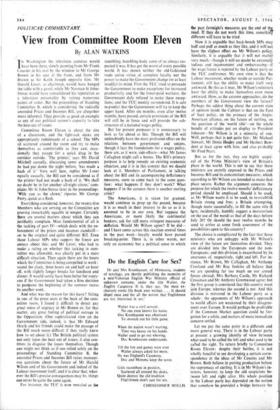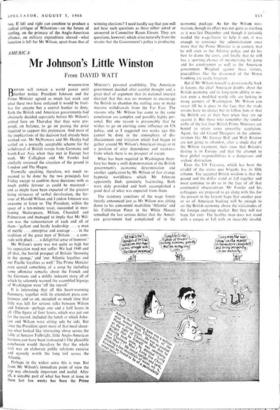POLITICAL' COMMENTARY
View from Committee Room Eleven
By ALAN WATKINS
Committee Room Eleven is about the size of a classroom, and the light-oak desks are appropriately reminiscent of a school. The MPs sit scattered around the room and try to make themselves as comfortable as they can; occa- sionally they escape for a quick drag in the corridor outside. 'The printer,' says Mr David Mitchell casually, discussing some amendments he had put down the night before, `has made a hash of it.' Very well then, replies Mr Lever equally casually, the Bill can be considered as if the printer had not made a hash of it. 'We shall no doubt be in for another all-night circus,' com- plains Mr St John-Stevas later in the proceedings.
th you as the clown,' ripostes Mr George Perry, quick as a flash.
'Everything considered, however, the twenty-five Members who are serving on the Committee are proving remarkably equable in temper. Certainly there are several matters about which they can justifiably complain. Most fundamental of all is the tacking of part IV—which deals with the en- forcement of the prices and incomes standstill— on to the original and quite different Bill. Even those Labour MPs who support the freeze are uneasy about this; and Mr Lever, who had to make a ruling on whether this tacking in com- mittee was allowable, was clearly put in a most difficult situation. Then again there are the hours which the Committee is being compelled to work : round the clock, three hours on and half an hour off, with slightly longer breaks for luncheon and dinner. It would surely have been better for every- one if the Government had taken a firm decision to postpone the beginning of the summer recess by another week.
And what was the reason for this haste? Sitting in one of the press seats at the back of the com- mittee room, I found it difficult to detect any great sense of urgency in Mr Brown or, for that matter, any great feeling of political outrage in the Opposition. (One sophisticated view on the Government side, indeed, is that Mr Edward Heath and his friends could make the passage of the Bill much more difficult if they really knew how to set about it.) The British political system not only takes the heat out of issues; it also con- trives to disguise the issues themselves. Though one might not think so if one relied solely on the proceedings of Standing Committee B, the amended Prices and Incomes Bill raises moment- ous questions about the future of Mr Harold Wilson and of his Government and indeed of the Labour movement itself; and it is clear that, what- ever the Bill's precise consequences may be, things can never be quite the same again.
For instance, the TUC is now revealed as the stumbling, bumbling body some of us always sus- pected it was. It has got the worst of every possible world. It has shown neither the old-fashioned trade union virtue of complete loyalty nor the power to make the Government change (or at least modify) its mind. First the TUC tried to persuade the Government to make exceptions for increased productivity and for the lower-paid workers; the Government duly refused to make these excep- tions; and the TUC meekly surrendered. It is safe to predict that the Government will try to keep the upper hand. After six months, even after twelve months, have passed, certain provisions of the Bill will still be in force and will provide the sub- structure of a national wages policy.
But for present purposes it is unnecessary to look as far ahead as this. Though the Bill will undoubtedly have the most profound effect on the relations between government and unions, though it lays the foundations for a wages policy, these are, as it were, side-effects—what Mr James Callaghan might call a bonus. The Bill's primary purpose is to help remedy an existing economic situation, and it is in this context that we should look at it. Members of Parliament, in talking about the Bill and its accompanying deflationary measures, seem to come back to the same ques- tion : what happens if they don't work? What happens if in the autumn there is another sterling crisis?
The Americans, it is taken for granted, would continue to prop up the pound, because it is as 'much in their interest to do so as it is assumed to be in our own. But' suppose the Americans, or more likely the continental bankers, ask for still more stringent measures of deflation. Would Mr Wilson agree? If he did— and I have come across this reaction several times in the past week—loyalty would have passed breaking-point. There is, in other words, not only an economic but a political sense in which
the past fortnight's measures are the. end of thi road. If they do not work this time, somethiritr different will have to be tried.
Now it is arguable that back-bench MPs may huff and puff as much as they like, and it will not have the slighest effect on Mr Wilson's policy: Similarly, it is arguable that it will not matter very much—though it will no doubt be extremely tedious and inconvenient and embarrassing—if the wage freeze is rejected by the Labour party or the TUC conference. My own view is that the Labour movement, whether inside or outside Par- liament, still has the ability to make itself very awkward. Be this as it may, Mr Wilson's ministers have the ability to make themselves even more awkward. How, as the autumn approaches, do the members of the Government view the future? Perhaps the oddest thing about the current state of opinion inside the Cabinet is that on the East of Suez policy, on the primacy of the Anglo- American alliance, on the future of sterling, on the question of the 'world role'—on the whole bundle of attitudes put on display to President Johnson—Mr Wilson is in a minority of one. Well, perhaps that is not quite fair : Mr Michael Stewart, Mr Denis Healey and Mr Herbert Bow- dent at least agree with him, and also probably Mr Fred Peart.
But as for the rest, they are highly scepti- cal of the Prime Minister's view of Britain's place in the world. This is not to say that these ministers are secretly opposed to the Prices and Incomes Bill and its concomitant measures, which according to Mr Wilson are intended to make that place secure. Rather the argument concerns the purpose for which the twelve months' deflationary period should be employed. Should it be used,. as Mr Wilson wants it to be used, to re-establish Britain strong and free; a Britain attempting, though more successfully, to fill the same role (I here, incidentally, humbly suggest a moratorium on the use of the word) as that of the days before July 20? Or shoidd the next twelve months be used to arrive at some fresh assessment of the possibilities open to this country?
The choice is complicated by the fact that those ministers who are unhappy with Mr Wilson's view of the future are themselves divided. They are divided into the Europeans and the non- Europeans; and this division is exacerbated by its overtones of, respectively, right and left. For in- stance, Mr Brown, Mr Callaghan, Mr Anthony Crosland and Mr Roy Jenkins all believe that we are spending far too much on our armed forces abroad; Mrs Barbara Castle, Mr Richard Crossman and Mr Anthony Greenwood agree; but the first group is convinced that this country must join Europe, whereas the second is not. And this division is mirrored in the Labour party as a whole : the opponents of Mr Wilson's approach to world affairs are weakened by their disagree- ment over Europe. It would perhaps be profitable if the Common Market question could be for- gotten for a while, and matters of more immediate concern settled.
Let me put the same point in a different and more general way. There is in the Labour party at present a growing identity of view between what used to be called the left and what used to be called the right. To return briefly to Committee Room Eleven : despite their battles, it is not wholly fanciful to see developing a certain corre- spondence in the ideas of Mr Cousins and Mr Brown. Both believe in putting production before the supremacy of sterling. It is in Mr Wilson's in- terests, however, to keep the old suspicions be- tween left and right alive. His whole position in the Labour party has depended on the notion that somehow he provided a bridge between the two. If left and right can combine to produce a radical critique of Wilsonism—on the future of sterling, on the primacy of the Anglo-American alliance, on military expenditure abroad—what function is left for Mr Wilson, apartirom that of
winning elections? I need hardly say that you will not hear such questions as these either asked or answered in Committee Room Eleven. They are questions, however, which arise naturally from the strains that the Government's policy is producing.






























 Previous page
Previous page